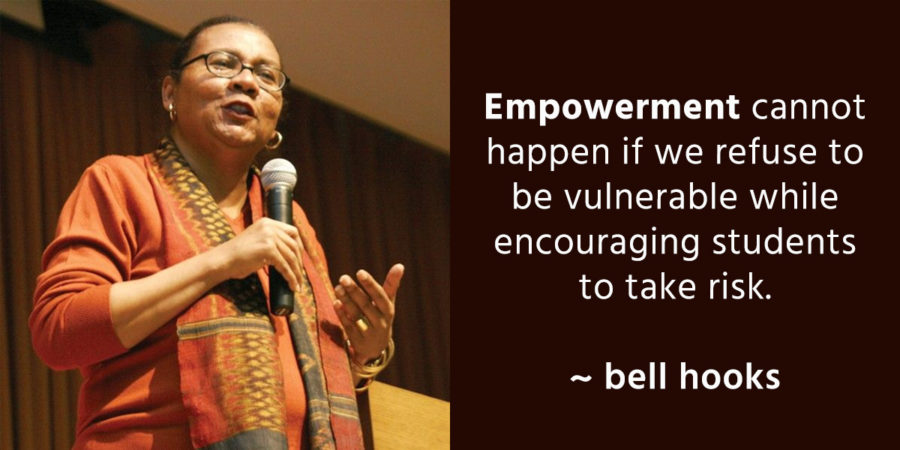If you hang around social justice facilitators long enough, you’re likely to hear two book titles come up: Pedagogy of the Oppressed and Teaching to Transgress: Education as a Practice of Freedom by bell hooks.
At first pass, this doesn’t look like a book about facilitation. In fact, when I searched the book for the word “facilitation” first with my eyes and then with a command f command in google books, the word isn’t to be found. But that’s exactly what the book, particularly the first 75 pages, are about. Teaching to Transgress is a must-read, especially if you believe that teaching and facilitation not only educate, but empower, enliven, awaken, and inspire.
Teaching to Transgress is a series of essays ranging from how integrating schools did not integrate pedagogy to a dialogue between hooks and Paulo Freire. Each chapter flows together and also stands alone. As the back of the book jacket describes:
“Full of passion and politics, Teaching to Transgress combines a practical knowledge of the classroom with a deeply felt connection to the world of emotions and feelings. This is the rare book about teachers and students that dares to raise critical questions about eros and range, grief and reconciliation, and the future of teaching itself.” (back cover)
My main takeaways from this book were:
- How education is a practice of freedom (and what it mean to teach in line with that belief)
- The importance and knowledge of how of creating non- (or less) hierarchical educational spaces
- To question what is seen as valuable knowledge (and who contains that knowledge)
- How the pedagogy we use, as much or more than content we focus on, is part of the process of empowering others and transforming the systems of education
As more of us ask the question, “How do we facilitate in a socially just way?” hooks’s words continue to increase in relevance. Not just a book for those do social justice education, but for any educator, math, science, technology, or otherwise who want to transform their classrooms environments into spaces for new
Quotes to Inspire
While the book is chock-full of goodness here were some of our favorite related to facilitation.
The professor must genuinely value everyone’s presence there must be an ongoing recognition that everyone influences the classroom dynamic, that everyone contributes…these contributions are resources. (pg 8)
…there is an aspect of our vocation that is sacred, who believe that our work is not merely to share information but to share in the intellectual and spiritual growth of our students. (pg 13)
This pedagogical strategy is rooted in the assumption that we all bring to the classroom experiential knowledge, that this knowledge can indeed enhance our learning experience. If experience is already invoked in the classroom as a way of knowing that coexists in a nonheirarchical way with other ways of knowing, then it lessens the possibility that it can be used to silence. (pg 84)
Favorite Thing about this Book
A sense of community. As a social justice facilitator who believes in the transformative power of facilitation to engage participants, and to upset systems of traditional educational hierarchy, I felt deeply seen reading this book. It felt like bell hooks was saying things that I had felt, but with more eloquence, more insight, and in a more accessible way. With power and authority, accessibility, and great humility, bell hooks offers connection, community, and mentorship, all on the written page.
I Recommend This Book for…
- Those who believe facilitation/education is a transformational practice (for both educator & student) or who want to find out more
- Anti-banking model of education believers and community seekers
- All socially just and social justice facilitators alike

